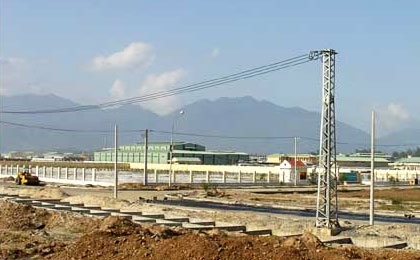FDI helping to water down sparks from trade deficit
 |
Joy at the trade deficit having come under control was short-lived, with September’s shortfall again exceeding the $1 billion mark. On aggregate, the trade deficit in 2010’s first nine months reached $8.65 billion, up 19.4 per cent year-on-year. In August, the figure calmed down to $390 million.
Prakriti Sofat, regional economist at Barclays Capital, said improved trajectories for inflation and the trade deficit should ensure near-term local currency stability.
“However, growth bias means there may be some further depreciation. Our three and six-month forecasts are VND19,500 and VND19,800 per dollar.
On the other side, pledged foreign direct investment (FDI) totaled $12.2 billion in the first nine months of the year, down 12.7 per cent year-on-year and also well below the government’s target of $22-25 billion for 2010. Meanwhile, FDI disbursements during January-September rose by 4.8 per cent on-year to $8 billion.
“We expect Vietnam’s forex reserves to end 2010 at $17 billion versus $15.2 billion at end-2009, supported by strong FDI (around $10 billion) and remittances (around $6 billion) inflows,” added Sofat.
Credit Suisse economist Robert Prior-Wandesforde said Vietnam faced no huge funding concerns.
“This is not to say that the country is facing significant external financing problems. The current account shortfall is smaller than the trade deficit, thanks partly to remittance flows, while FDI commitments continue to flood in,” said Prior-Wandesforde.
He said Vietnam’s foreign exchange reserves were thought to be $15-20 billion, equivalent to over two months of imports.
With a more cautious look, HSBC economist for ASEAN Sherman Chan said that import growth continued to outpace export growth and there were no signs that the trend could be reversed any time soon.
“The trade deficit is dipping a little too far into the red for comfort, though Vietnam has not entered the emergency mode yet. It is still important that policymakers attend to revived concerns promptly so as to prevent a further deterioration, ease pressures on the dong, and maintain investor confidence,” said Chan.
What the stars mean:
★ Poor ★ ★ Promising ★★★ Good ★★★★ Very good ★★★★★ Exceptional
 Tag:
Tag:
Related Contents
Latest News
More News
- Foreign fruits flood Vietnamese market (December 09, 2025 | 13:22)
- Vietnam’s fruit and vegetable exports reach $7.8 billion in first 11 months (December 05, 2025 | 13:50)
- Vietnam shapes next-generation carbon market (November 26, 2025 | 15:33)
- PM urges Ho Chi Minh City to innovate and remain Vietnam’s economic locomotive (November 26, 2025 | 15:29)
- Experts chart Vietnam's digital finance path: high hopes, high stakes (November 14, 2025 | 10:56)
- Vietnam’s seafood imports surge 30 per cent in first 10 months (November 10, 2025 | 19:35)
- Vietnam’s durian exports hit $1 billion milestone (October 30, 2025 | 17:41)
- Beyond borders: Sunhouse and new era of Vietnamese brands on Amazon (October 28, 2025 | 10:46)
- Record-breaking trade fair set to open in Hanoi (October 15, 2025 | 15:59)
- Timber sector seeks solutions to VAT refunds (October 14, 2025 | 18:58)





















 Mobile Version
Mobile Version